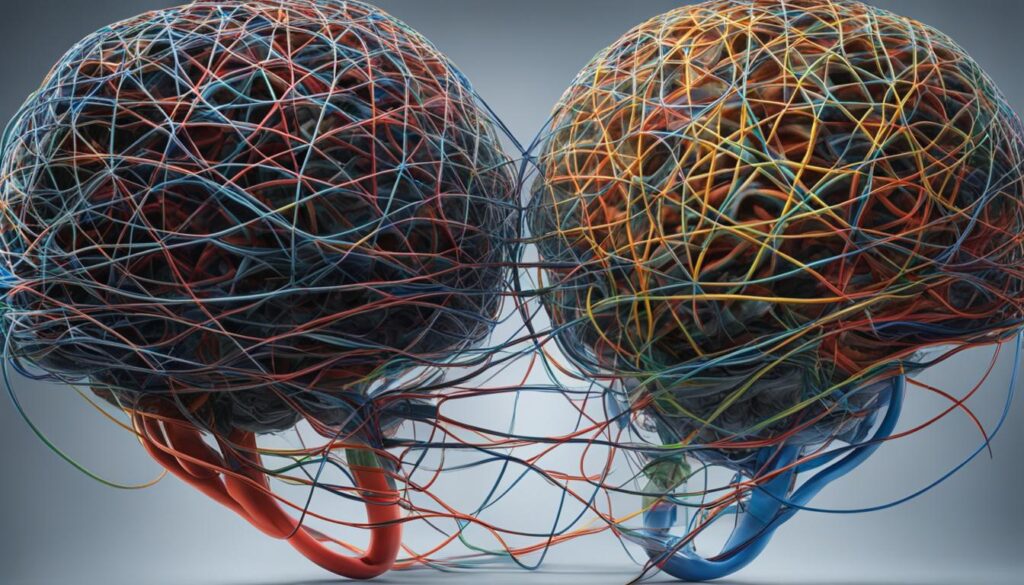If you’re reading this article, you’re likely spending significant time online. Have you ever stopped to consider how that’s affecting your brain? In his audiobook, “The Shallows,” Nicholas Carr explores the impact of prolonged internet usage on our cognitive abilities.
Carr’s book challenges the conventional wisdom that the internet is a tool that enhances our intellect and productivity. Instead, he argues that the shallowness of online content, combined with the constant distractions and interruptions of the digital world, is harming our ability to think deeply and creatively.
As you read on, we’ll examine some of the key ideas in “The Shallows,” from the effects of brain plasticity to the rise of social media, and offer some key takeaways for navigating the digital age.
Key Takeaways:
- Our brains are plastic and can adapt to the experiences we have, including prolonged internet usage.
- The internet has had a transformative impact on society, but also poses risks to our attention span and ability to focus.
- Cognitive overload due to the constant stream of information can have negative effects on our ability to learn and remember.
- Deep reading experiences are becoming increasingly rare, potentially limiting our critical thinking skills.
- Social media can have negative effects on our self-perception and mental well-being.
Understanding the Brain’s Plasticity
Our brains have a remarkable ability to adapt and change in response to our experiences. This phenomenon, known as brain plasticity, is what allows us to learn new skills, form memories, and recover from injuries.
However, prolonged exposure to the internet may have some unintended consequences for our brain plasticity and cognitive abilities. Research has shown that excessive internet use can lead to a decrease in gray matter in regions of the brain responsible for attention and cognitive control. Additionally, studies have suggested that constant stimulation from the internet can lead to a reduction in our ability to focus and concentrate.
| Brain Plasticity and Internet Usage | Effects on Cognitive Abilities |
|---|---|
| Excessive internet use can lead to decreased gray matter in the brain. | Internet usage can negatively impact attention, focus, and cognitive control. |
| Habitual internet usage can lead to the formation of new neural pathways in the brain. | Altered brain function due to internet usage can affect memory and recall abilities. |
| Brain plasticity allows for the potential to rewire the brain through focused cognitive practice. | Limiting internet usage and engaging in cognitive exercises may lead to cognitive improvements. |
It’s important to recognize the potential impact of prolonged internet usage on our brain plasticity and overall cognitive abilities. By becoming more aware of our internet habits and taking intentional steps to engage in focused cognitive practices, we can work to mitigate any negative effects and optimize our brain function.
The Rise of the Internet
The internet has revolutionized the modern world and drastically changed the way we live, work, and interact with each other. From its humble beginnings as a military communication network to its widespread adoption in the late 1990s, the internet has undergone a significant evolution over the past few decades.
Today, the internet is ubiquitous, and its impact can be felt in every aspect of human life. The digital age has opened new avenues for communication and commerce, allowing people to connect and engage with a global audience from anywhere in the world. It has also transformed the nature of work, enabling remote collaboration and changing the traditional office dynamic.
The Evolution of the Internet
The internet first emerged in the late 1960s as a research project funded by the US Department of Defense. Its aim was to create a communication network that would link government researchers and allow them to share resources. Over the years, the internet expanded from an academic and government tool to a public space accessible to all. The advent of the World Wide Web in 1989 further accelerated the internet’s evolution, making it more user-friendly and accessible to the general public.
The internet’s growth has been exponential, with the number of internet users worldwide rising from just over 400 million in 2000 to over 4.6 billion in 2021. This growth has been fueled by advances in technology, including mobile devices, increased bandwidth speeds, and improvements in internet infrastructure.
The Transformative Impact of the Internet
The internet has transformed every sector of society, from education and healthcare to politics and entertainment. It has enabled the rise of e-commerce, online education, and remote work, revolutionizing the way we do business and learn. It has also facilitated the rapid exchange of information, allowing for more transparent and democratic societies.
However, the transformative impact of the internet is not without its drawbacks. The constant barrage of information and communication can be overwhelming, leading to cognitive overload and decreased productivity. The rise of social media has also been associated with increased feelings of isolation and anxiety, making it necessary to strike a balance between digital engagement and disengagement.
“The internet is becoming the town square for our global village.” – Bill Gates
The Shifting Nature of Attention
The internet has revolutionized the way we interact with information, providing access to an endless stream of data at our fingertips. However, this endless supply comes at a cost. According to a study by Microsoft, the average attention span of a human has decreased from 12 seconds in 2000 to 8 seconds in 2015, highlighting the impact of internet usage on our ability to focus and concentrate.
The constant stimulation of information through multiple devices has led to an increase in multitasking, making it challenging to concentrate on a single task. A study conducted by Stanford University found that heavy multitaskers had more difficulty filtering out irrelevant information and were more easily distracted. This finding suggests that the more we engage in multitasking activities, the more our attention span is impacted.
A key reason why the internet has such a significant impact on our attention is due to its design. Social media, for example, is specifically designed to keep us engaged by utilizing algorithms that feed us with content tailored to our interests. The constant notifications that come from social media platforms serve to keep users engaged, significantly diminishing our attention span.
Adopting intentional focused practices such as removing distractions, time blocking, and organizing our environment can help mitigate the impact of internet usage on our attention span and cognitive abilities. By creating a structured, distraction-free environment, we can regain control of our cognitive abilities and ability to focus.
The Science Behind Internet Distraction
The constant stream of information available on the internet has led to cognitive overload and information overload. Research has shown that exposure to excessive information can cause mental exhaustion, affect decision-making, and impair short-term memory.
In a study by the University of California, San Francisco, participants who were constantly interrupted by email and phone messages while working on a task experienced a 50% increase in stress levels as well as a significant decrease in their ability to focus and complete the task effectively.
The brain’s capacity to process information is finite, and the overwhelming amount of data available on the internet can create a state of cognitive overload, leading to decreased productivity and an inability to process and retain information effectively.
Strategies for Reducing Cognitive Overload
To combat cognitive overload, experts recommend limiting exposure to non-essential information, such as social media notifications, email alerts, and news alerts. Taking regular breaks, practicing mindfulness, and prioritizing focused tasks can also help prevent mental exhaustion and increase productivity.
By intentionally managing our internet usage and prioritizing cognitively demanding tasks, individuals can avoid the negative effects of information overload and enhance their mental clarity and performance.
Rewiring the Brain through Internet Use
Our brains are incredibly adaptable, with the ability to change and reorganize neural pathways based on experiences and behavior. This process, known as brain plasticity, is essential to our cognitive development and the formation of new memories. However, the constant availability and stimulation of the internet has been shown to alter this process, potentially leading to the rewiring of our brain’s structure and function.

| Effects of Internet Use on Brain Function | Research Findings |
|---|---|
| Decreased attention span and ability to concentrate | Studies have shown that excessive internet use can lead to decreased gray matter volume in the parts of the brain responsible for attention and cognitive control. |
| Increased information processing speed | Research has indicated that frequent internet use can enhance cognitive processing speed, potentially due to the increased demands of multitasking and rapid information processing. |
| Altered memory retention and recall | Neuroimaging studies have suggested that the reliance on digital devices for storing information may reduce the capacity for the long-term storage of memories and negatively impact recall abilities. |
These findings highlight the complex and multifaceted effects of habitual internet usage on our cognitive function, indicating the need for further research and intentional management of our digital habits.
Impact on Memory and Recall
The human brain is highly adaptable, but prolonged internet usage has been found to have long-lasting impacts on cognitive abilities. One area of study that has been of particular interest is the effect of internet usage on memory formation and recall ability. With the vast amount of information readily available on the internet, it’s easy to fall into the trap of relying on “externalized memory,” where we depend on technology to remember information rather than our own brains.
Research has shown that this dependency can have detrimental effects on our memory and recall abilities. A study conducted by Betsy Sparrow and her colleagues, published in the journal Science, found that people remembered information less when they knew they could easily access it later via the internet. This phenomenon has come to be known as the “Google Effect.” Essentially, when we rely too heavily on technology to remember things, our brain’s memory storage capacity declines.
Additionally, the distraction and multitasking that often accompanies internet use can also impact our ability to form and retain memories. While we might feel like we’re being productive by quickly switching between tasks or browsing multiple pages, studies have shown that this type of behavior can actually impair our memory formation and recall abilities.
Overall, the effects of internet usage on memory and recall ability are concerning, and it’s essential that we take steps to manage our technology use to prevent long-term impacts on our cognitive abilities.
The Diminishing Art of Deep Reading
Deep reading, the practice of immersing oneself in a text to gain a deep understanding of its meaning and subtext, is an art form that is rapidly disappearing in the digital age. As Nicholas Carr points out in “The Shallows,” the constant distractions and interruptions of the internet have made it difficult for us to engage in the kind of sustained, focused reading that is necessary for truly critical thinking.
But what exactly are we losing with the decline of deep reading?
“[Deep reading] is indistinguishable from deep thinking. If we lose those quiet spaces, or fill them up with ‘content,’ we will sacrifice something important not only in our selves but in our culture.”
The ability to engage in deep reading allows us to approach complex topics with a critical and thoughtful eye, enabling us to draw meaningful connections and insights that we might not have seen otherwise. It also helps us develop empathy and perspective, as we use our imaginations to inhabit the minds of characters and understand their experiences.
Yet, as we move further into the digital age, deep reading is becoming a lost art. The constant distractions and bite-sized chunks of information that dominate our online lives make it difficult for us to engage in the kind of long-form reading that is required for deep understanding and nuanced thinking.
If we want to cultivate strong critical thinking skills and ensure that we can engage with complex ideas, we must make a deliberate effort to prioritize deep reading in our lives.
One way to do this is to consciously carve out time for uninterrupted reading, away from the distractions of the internet and other technologies. Another is to seek out texts that challenge us and require sustained attention, rather than relying solely on easily digestible online content.
As we work to reclaim the art of deep reading, we can also take steps to encourage others to do the same. By approaching texts with curiosity and an open mind, and engaging in meaningful discussions with others about what we’ve read, we can help to reignite a passion for deep reading and critical thinking in our communities.
Social Media and the Self
Social media has become an undeniable part of modern life, with billions of users worldwide regularly engaging with platforms like Facebook, Instagram, and Twitter. These platforms allow us to curate our online presence, presenting carefully crafted versions of ourselves to the world. However, the impact of social media on our self-image and mental well-being is a growing concern.
Research has linked social media usage to negative effects on self-esteem and body image, particularly among young people. Constant exposure to highly curated images, often featuring filtered and edited versions of reality, can lead to feelings of inadequacy and insecurity. This can manifest in a range of behaviors, including disordered eating, excessive exercise, and even plastic surgery.
Moreover, social media usage has been linked to increased rates of depression, anxiety, and other mental health problems. One study found that young adults who spend more than two hours a day on social media are more likely to report poor mental health than those who spend half an hour or less.
It’s important to recognize the potential negative impact of social media on our self-perception and take steps to mitigate it. This can include limiting our usage, engaging in offline activities, and seeking professional help if necessary. By understanding the influence of social media on our self-image, we can take control of our digital lives and protect our mental health.
Reclaiming our Cognition
As internet usage has become more prevalent throughout society, it has become increasingly necessary to take measures to mitigate its potential negative effects on our cognitive abilities. Two main strategies that have gained popularity in recent years are cognitive reclamation and digital detox.
Cognitive reclamation involves intentionally practicing focused, deep work in order to improve concentration and productivity. By limiting interruptions and distractions, we give our brains the opportunity to fully engage with the task at hand, thus strengthening cognitive processes and improving overall mental performance.
Digital detoxes, on the other hand, involve taking a break from all forms of digital technology for a set period of time. This can be challenging, given the pervasiveness of technology in our daily lives, but can be highly beneficial for mental health and well-being. By disconnecting from technology and engaging in alternative activities such as reading, exercise, or socializing, we can recalibrate our brains and reduce the negative effects of prolonged internet usage.
“Pausing is very important to the creative process, and to life.” – Novelist Andrea Barrett
The Future of Our Brains in the Digital Age
As our dependence on technology grows, it’s crucial to consider the future implications for our cognitive abilities. Advancements in technology are likely to continue at a breakneck pace, and we must be aware of the potential risks associated with this evolution.
One area of concern is the impact of technology on our ability to think critically and engage in deep thought. As we become increasingly reliant on the internet for information, our capacity for analysis and synthesis may suffer. This could have severe consequences for fields that require high-level cognitive skills, such as science and engineering.
Another concern is the potential for technology to permanently alter the structure and function of our brains. As we spend more time online, our neural pathways may shift to accommodate that input. While this adaptation is not inherently harmful, it’s essential to consider the long-term implications.
The Importance of Deliberate Thoughtfulness
While we cannot predict the future, we can make deliberate choices about how we engage with technology. By recognizing the potential risks and taking steps to mitigate them, we can help ensure that our cognitive abilities remain sharp and robust.
One strategy is to engage in deliberate practice—intentionally focusing on a particular skill or cognitive process in a structured capacity. This can help counteract the potential for cognitive decline and rewire the brain for more in-depth thinking and analysis.
Another approach is to consider a digital detox, allowing yourself a break from technology to focus on other activities that stimulate the mind and promote critical thinking. This strategy can help promote mental clarity and reinvigorate the brain for more purposeful engagement with technology.
The Bottom Line
While technology has brought many benefits, it’s essential to recognize the potential risks it poses to our cognitive abilities. By remaining aware of these risks and making deliberate, thoughtful choices, we can help ensure a future in which technology and cognition coexist harmoniously.
Conclusion
In “The Shallows: What the Internet Is Doing to Our Brains,” Nicholas Carr provides a thought-provoking analysis of the impact of the internet on our cognitive abilities. His audiobook review highlights the potential consequences of prolonged internet usage on brain plasticity, attention span, memory formation, critical thinking skills, and self-perception.
As we continue to live in the digital age, it is crucial to understand and manage the impact of the internet on our brains. Strategies such as digital detoxes and intentional, focused cognitive practices can help us mitigate the negative effects of internet usage and reclaim our cognition.
In the future, it will be essential to be deliberate and thoughtful in our technological choices, considering the long-term implications of continued internet dependence. “The Shallows” serves as a reminder of the vital importance of maintaining control over our cognitive processes in a world inundated with information.
Overall, “The Shallows” is a must-read audiobook for anyone interested in the effects of technology on our brains and a sobering reminder of the importance of staying mindful in the digital age.
FAQ
What is "The Shallows" by Nicholas Carr?
“The Shallows” is an audiobook by Nicholas Carr that examines the impact of the internet on our brains and cognitive abilities.
What is brain plasticity?
Brain plasticity is the brain’s ability to adapt and change based on experiences, including prolonged internet usage.
How has the internet evolved over time?
The internet has undergone significant growth and development, becoming a transformative force in the digital age.
How does the internet affect our attention span?
The internet has led to shorter attention spans and increased multitasking, making it more challenging to focus and concentrate.
What is cognitive overload?
Cognitive overload is the overwhelming amount of information available on the internet, leading to difficulties in processing and retaining information.
Can internet use alter the structure and function of the brain?
Habitual internet usage can rewire the brain’s neural pathways, potentially changing how we think and process information.
How does the internet impact memory and recall?
The internet can affect memory formation and recall ability, with some relying on externalized memory rather than retaining information internally.
What is deep reading and why is it important?
Deep reading refers to focused, immersive reading experiences, which are declining due to internet distractions and have implications for critical thinking skills.
What effect does social media have on self-perception?
Social media can influence self-perception and identity formation, potentially leading to negative effects on mental well-being.
How can we mitigate the negative impact of internet usage?
Strategies such as digital detoxes and intentional, focused cognitive practices can help reclaim our cognitive abilities and manage internet dependency.
What are the future implications of technology on our cognition?
Continued internet dependence raises questions about the long-term consequences on our brains and emphasizes the need for thoughtful choices in our use of technology.
What are the key takeaways from "The Shallows" by Nicholas Carr?
“The Shallows” underscores the importance of understanding and managing the effects of the internet on our brains, calling for deliberate thoughtfulness in our technological choices.



